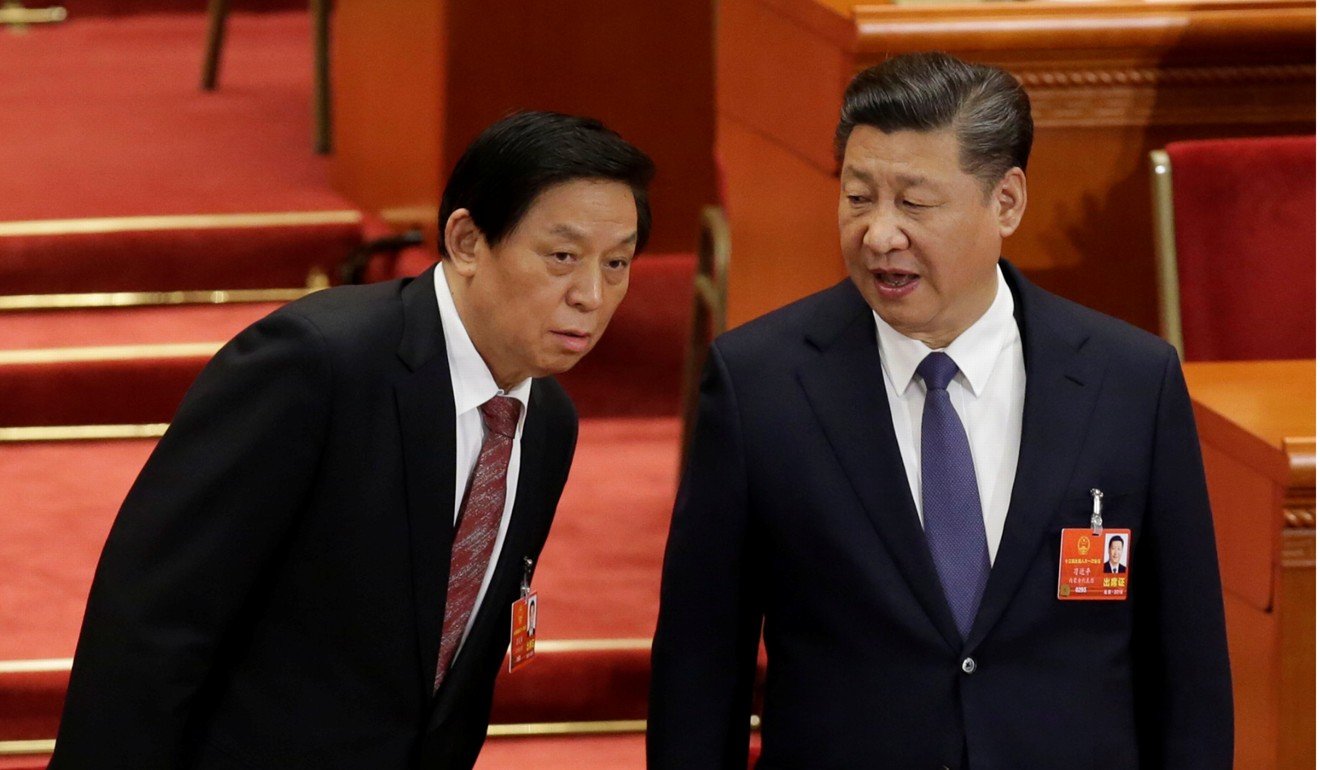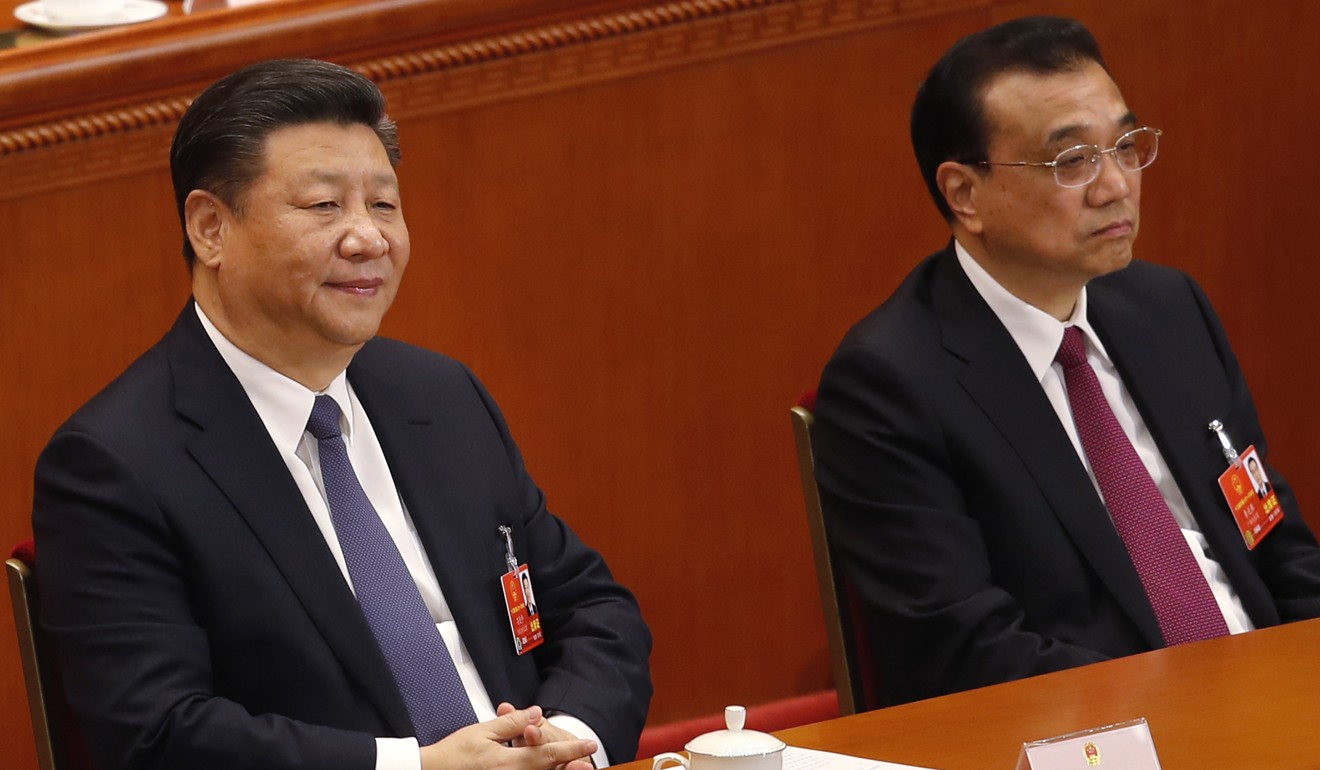
Chinese President Xi Jinping confident and relaxed as lawmakers vote to remove term limit
Constitutional revisions receive highest approval since 1999, with voting process completed in record time
Under the watch of a confident and relaxed President Xi Jinping, nearly 3,000 Chinese lawmakers were nearly unanimous in their approval on Sunday of changes to the state constitution that included removing the term limit on the presidency.
Xi, who had maintained a poker face throughout the opening day of China’s parliamentary session last Monday, appeared much more at ease on Sunday. He even smiled when Wang Cheng, the vice-chairman of the National People’s Congress, announced the final result of the voting. Only two of the 2,964 deputies voted against the constitutional revisions, three others abstained and one ballot was declared invalid.
This year’s constitutional revisions received the highest approval rating for such a move since 1999, with the whole voting process also completed in record time. The last time China amended its constitution, in 2004, it took almost two hours. Now, thanks to technology, the lawmakers took less than an hour to pass what was considered the most ambitious revision to the country’s modern constitution since its first draft in 1982.
There was no debate, no discussion and not even canvassing. The whole event was meticulously managed to the last detail. All the deputies gathered at the Great Hall of the People in Beijing at 3pm sharp. Each received a pink ballot paper the size of an A4 sheet. They were given a short briefing on how to use a specially designed pen to tick the box of their choice before putting the completed ballot papers in 28 red, electronic ballot boxes designed to immediately scan and record the results.

It was a smooth and error-free process – something many deputies say is how things in China should be run.
Against the backdrop of cheerful traditional Chinese music, Xi walked on to the stage to cast his vote amid thunderous applause. His trusted ally Wang Qishan – despite being only an ordinary party member after retiring from the party leadership in October – was also clapped loudly.
Wang Qishan, 69, sat on the second row of the podium, alongside members of the party’s Politburo. His seat was right after the seven members of the Politburo Standing Committee – the topmost body in Chinese politics. Every detail at such an important political event, including the sitting order, is carefully choreographed and carries a political message.
Sources have told the South China Morning Post Wang Qishan is expected to become China’s next vice-president. Like Xi’s presidency, there will be no limit on the term of the vice-president following Sunday’s revisions to the constitution.
The atmosphere on the podium was markedly more relaxed than a few days previously. Many top leaders looked more relaxed after casting their vote.
Wang Cheng, who presided over the process, chatted casually with Xi, Premier Li Keqiang and incoming NPC chairman Li Zhanshu – the three top-ranking party officials. Han Zheng, another member of the Politburo Standing Committee, busily engaged in conversation with Wang Huning, the top party official overseeing publicity, and Ding Xuexiang, a Politburo member who is Xi’s right-hand man as director of the party’s General Office.

With the whole event under heavy control, there was, unsurprisingly, a marked absence of dissenting voices inside and outside the Great Hall.
When asked about the voting, the deputies either enthusiastically voiced their support or walked away. Nobody deviated from the official line.
The biggest news of the day did not generate much discussion online in China. With the topic heavily censored, it was almost impossible to gauge true public sentiment. A few liberal voices did manage to find a way to express their discontent, but their voices appeared to be just a tiny minority.
At a press conference broadcast live of state media after the voting, the interpreter omitted a reference to the 1966-76 Cultural Revolution in a question from a Reuters correspondent.
Shen Chunyao, chairman of the NPC Standing Committee’s Legislative Affairs Commission, said the move to remove the term limit on the presidency would not risk a return to strongman rule or lead to political turmoil or infighting.
“As for the assumptions, conjecture and stretched situations in your question, I think that does not exist,” Shen said.
Additional reporting by Mimi Lau and Kristin Huang

